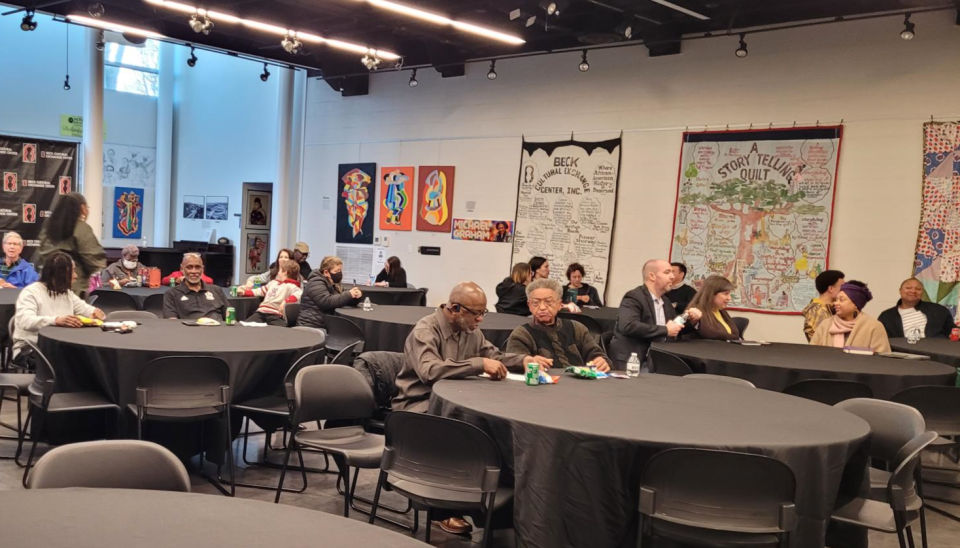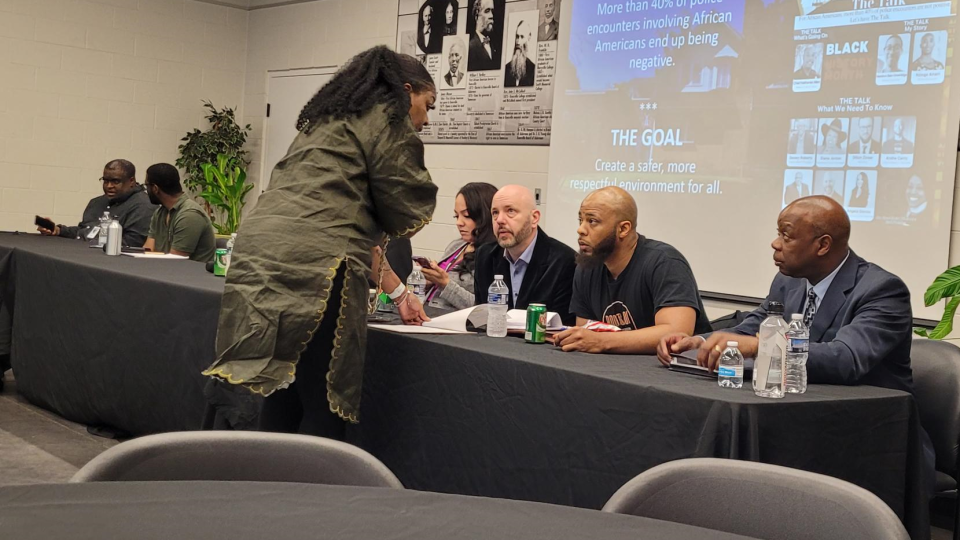Getting home safe: Community members discuss policing, accountability during forum at Beck
Community members gathered at the Beck Cultural Exchange Center Feb. 23 to have “the talk” about healthy and safe police encounters in Knoxville, especially those involving Black people.
The discussion was led by a nine-person panel comprised of two people who have been subjected to excessive force during arrests, a former Knoxville Police Department deputy chief, a defense attorney, community organizers and leaders, and two Knox News journalists with experience in public safety journalism.
“What is excessive amount of police?” Tiffaney Kyle, a mother of four, asked the panel. “My house was surrounded with 10 police cars for my one son, who was 20 at the time, who had a violation, not a violent offense or anything like that.”
Solutions and tactics discussed during the two-hour forum included better de-escalation and cultural competency training for officers, alternative response teams for non-violent calls, holding institutions accountable, pushing to change and enforce internal policies and filing complaints with the Police Advisory and Review Committee, commonly called PARC.
“I have made the calls. I have complained. I've been through PARC,” Kyle said about filing complaints. “So, what do you do when you make these calls, make these emails and there’s still no response?”
One path forward is continuing to sound the alarm as a community by consistently attending city meetings, filing complaints and having an organized political strategy, police reform activist Nzinga Amani suggested.
“Show them ways (how) people are supporting you, so they know that if they mess with you, they mess with all of us,” Amani said.
“We have to come together as a group and we can insist on certain policies,” former Knoxville Police Department deputy chief Nate Allen added. “You got to say something.”
Even though she is a quiet person, and speaking out and filing complaints can be a scary, Kyle told Knox News that sharing experiences was her biggest takeaway of the night.
“If we see injustice (by) the police or even an elected representative, we need to stand up and say something, and these events help promote that,” she said. “It's not just a safe space … it's a brave space. There’s gonna be hard questions, there’s going to be hard discussions, but we have to be brave enough to enter in those spaces.”
Laura Humphrey, who attended the forum, strongly feels there’s a need for alternative response teams and oversight committees to hold officers and law enforcement departments accountable.
“It is a competitiveness that is put out there between citizens and the police. So, to have that third party helps to level that off, that you have an advocate there,” she told Knox News.
Humphrey has a political science background and often focuses on policies. But she values Kyle and others who share their experiences.
“I'm not a person of color, you know, but I can now identify the relationship (with officers) whereas maybe I could not identify before. So, that's how Important it is to speak about it,” she said. “Stories, to me, is absolutely the best way to make those relationships happen and to bring us back to the human element.”

What should you know about police encounters
Allen, a retired police chief with over 35 years of experience, offered his firsthand knowledge of what should be expected of officers, how to hold them accountable and ways to avoid conflict.
“My message to you is that we have to work it from the inside out. We only have one system,” Allen said. “It's my job now to teach people the system and how to work the system.”
The goal is for everyone to go home safe, Allen said. Officers should approach people calmly and de-escalate if conflict or tensions begin to rise. He suggests people comply during the initial encounter. And if there’s wrongdoing on the part of police, take notes, record them and file a complaint.
“You deal with it when the situation on the street is over with because the police officer always wins the encounter on the street," Allen said. "(You) can win the encounter when (you) go to the courtroom or when you go to complain.”
Some community members, including Amani, pushed back on the idea of working within the system, particularly when internal department policies are not enforced when wrongdoing is proven.
“We actually need tangible power in the system,” Amani said. “We need new systems to take care of our people and systems that are outside law enforcement and outside of mass incarceration,” he said while advocating for community-based policing and mental health teams for non-violent calls.
Andre Canty of Cities United, an organization that aims end community violence and nurture healthy communities, advised knowing your rights such as freedom of speech, the right to protest, illegal search and seizures and the right to remain silent.
He also suggested becoming familiar with state rights, the American Civil Liberties Union (ACLU) and the Know Your Rights Camp, an organization that helps people navigate situations with law enforcement.

What are Tennessee’s laws on police misconduct?
Tennessee doesn’t have a lot of laws pertaining to policing, according to defense attorney Dillon Zinser.
“The 10th Amendment of the United States Constitution delegates policing powers to the state. But in the state of Tennessee, at least, there's not really many laws that govern police conduct. There's plenty of laws that give police broad immunity powers,” he explained.
People can sue police departments if a Constitutional amendment has been violated. But because of few state laws, this leaves misconduct cases to be handled internally. KPD and the Knoxville Sheriff’s office each have their own internal policies.
“As far as how the law defines police interactions, it reinforces whatever the police say the interaction is, and that's a sad truth,” Zinser said.
Zinser has worked on over a thousand criminal cases and mostly represents court-appointed clients. The increased use of body and police cruiser camera footage over the past five years has helped his clients in court.
Policy dictates that body cams should turned on during any interaction, and cruiser cams should start recording when the blue lights are activated, Zinser said. But a few community members noted that not all officers follow the policy and it’s not being enforced even after complaints are made.
Panel member Nahshon Bain-Greenidge suffered injuries to his head, face and hand when deputies arrested him last year. All charges against him were dropped by prosecutors, but some sheriff deputies muted their body cams during his arrest, he said.
“There should be some sort of recourse for that as well, because what is the point of the body cams if they could just mute themselves?” Bain-Greenidge said. Allen suggested pushing for financial penalties when an officer fails to follow camera policy.
How to file a complaint against police officers
If you think you have been unjustly treated by law enforcement or witnessed or have knowledge of police misconduct, a complaint can be filed with KPD’s Office of Professional Standards (OPS) at 865-215-7361 or the Police Advisory and Review Committee at 865-215-3869.
PARC is independent of KPD and is a “civilian oversight committee” that reviews KPD complaints, discipline process, policies and procedures and closed OPS cases.
“I'm a firm believer that the people who are policed should define police procedures,” PARC director Jered Croom said. “Make a formal complaint so I can put my teeth into it so that I can use the weight of this office to move the momentum towards equity and justice.”
Complaints to PARC can be made via phone, online a knoxvilletn.gov/government/boards_commissions/police_advisory_review_committee_parc, in person, or written to Croom at P.O. Box 1631, Knoxville, TN 37901. Complaints can be made anonymously, too.
Devarrick Turner is a trending news reporter. Email devarrick.turner@knoxnews.com. On X, formerly known as Twitter @dturner1208.
Support strong local journalism by subscribing at knoxnews.com/subscribe.
This article originally appeared on Knoxville News Sentinel: Community members discuss policing, accountability in Knoxville

